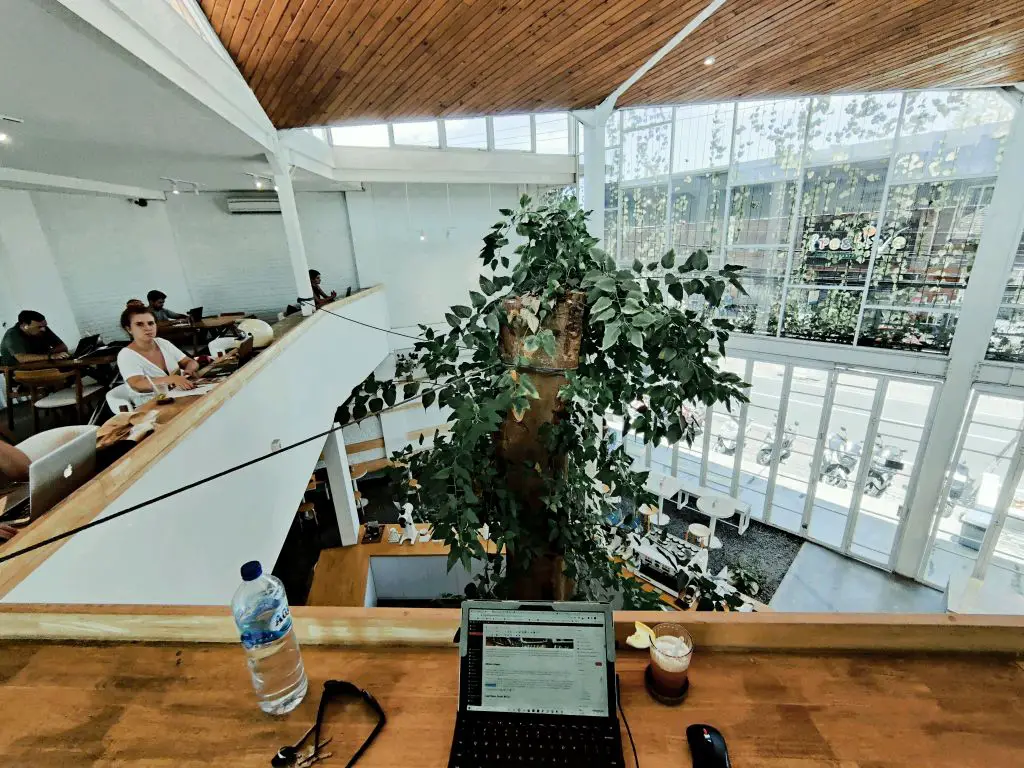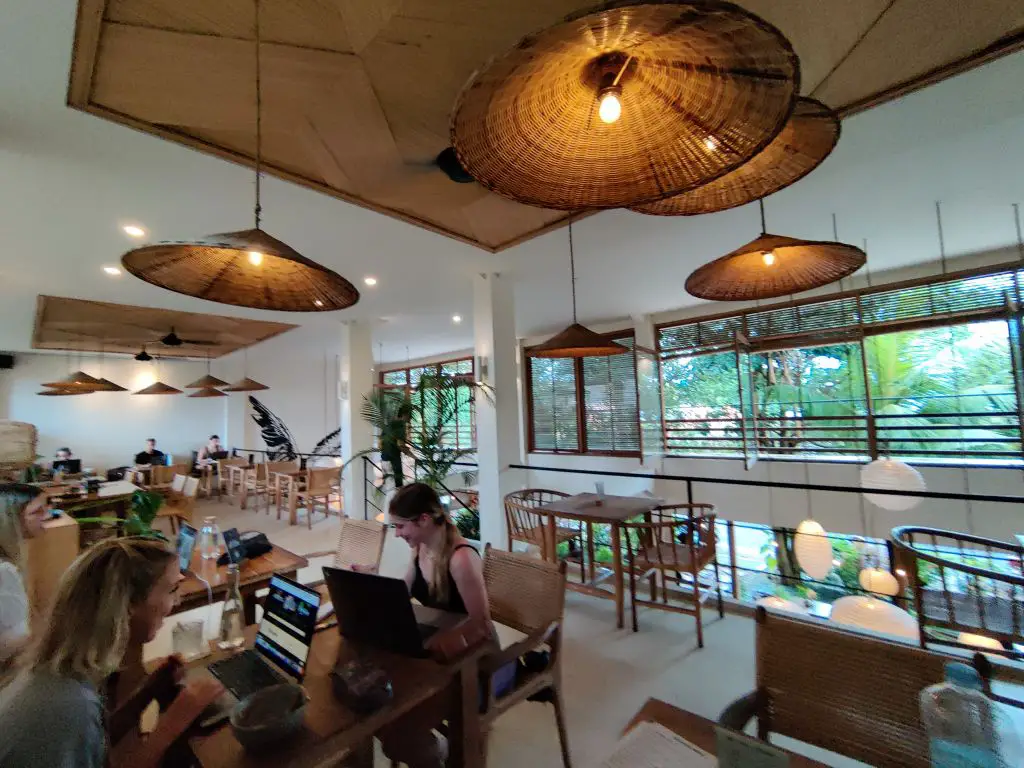The pandemic has changed almost every facet of our lives. Many of them for the better. One of them is how we work. COVID has completely upended the traditional style of work where almost everyone commuted into their jobs and offices five days a week. This often involved sitting at a desk staring at a screen for the whole day; something you could easily have done at home.

Cue the pandemic and now companies are all being forced to reconsider the office plans that have been core to their central being for generations. Millions of office workers around the world will not be able to work remotely, whether that is at home, or in some other destination. As time progresses, it seems like more and more companies like Airbnb are making remote work a permanent thing.
As I am a travel blogger and someone that is a staunch supporter of remote work, the world is now your oyster (literally). If you’re lucky enough to have a job that will allow you to work remotely or even on a part time scale, working while traveling is now a possibility. This has created a whole new world of remote workers, or digital nomads. If you are one of these or aspire to be one, this post will go in depth of how to do it safely without getting in trouble.
Where I’ve worked abroad
As I am now a full time traveler, blogger, and options trader I can work anywhere I want. I’ve spent extended periods of time in many places around the world and these are some of my favorites below. Make sure to read my list of best Digital nomad places for 2022 to see an extended list!
Benefits of working remotely while traveling
Even before COVID, I never fully understood why some people had to come into the office 5x a week. Some of these people didn’t even speak to anyone else for the whole day and just stared at their computer screens from the morning until the late afternoon. This is not to say everyone should be working from home. There were certain jobs when I was working a traditional desk job that definitely benefited from being around other people. However, I would say that 90% of jobs had no meaningful reason to always be in an office.

Working from home is already an amazing step in the right direction because it cuts down the need for people to waste money and natural resources on commuting, de-congests the streets, allows people to save money, and be more productive.
As a result of working from home, working while traveling is even better. As someone who has visited almost 90 countries, this is an absolute blessing. Sadly, this whole pandemic shift in working only became mainstream after I achieved financial independence and quit my day job. Nevertheless, I was able to squeeze a few months of remote working in.
When normal vacation just isn’t enough
You might ask, why would I travel somewhere just to work there? Doesn’t that defeat the purpose of taking a vacation?
Yes and no.
The traditional vacation model would be that you would work yourself to the point where you needed a break to unwind from everything and proceed to use the few weeks of available vacation you have to go somewhere. In the US, this is something like 3-4 weeks a year if you’re lucky. In Europe, it’s much more generous at 5 weeks +.

I don’t know about you, but this is hardly enough time to really explore the world and really travel somewhere. I always maintain that vacationing and living somewhere are two totally different experiences. You don’t really get a real sense of where you’re going when you’re on a vacation because you often pack way too much into a short amount of time.

This is not a problem if you can work remotely. Not only do you have time to “slow travel”, but you also get to immerse yourself just a tiny little bit more into the local culture. Not only does this let you break yourself from the day to day routine at home, but you get to go somewhere beautiful, enjoy the local scenery during the nights and weekend, and allow you to see a part of the world you never would have if you had just stayed at home.

Tax benefits for US citizens
If you’re an American citizen and planning to work remotely in another country, then you must familiarize yourself with the FEIE, or the Foreign earned income exclusion. This wonderful tax deduction will allow you to deduct $110k (as of 2022) per year from your salary if you stay out of the country for 330 days or more.
This means if you earn $110k or less per year, you essentially pay zero taxes.
Yes, not joking. If you simply work outside of the US for the majority of the year, you can deduct a huge sum of money from your taxes. So not only could you go surfing on your midday break, but you can also save something like $20k to $30k a year in taxes!
Hybrid vs Fully Remote
COVID has already run its course for over 2 years and the changes that have emerged have all matured. In the case with working, there have been two types of remote working that have become the dominant factions; fully remote work, and hybrid work.
If you’re working hybrid, this means you have to go into the office at least x days a week whereas a fully remote job is where you can go to the office but are not required. You can work from home for as long or as much as you want.
If you have a hybrid job, you are technically required to come into the office for 2-3 days a week. However, this isn’t normally written in stone. In today’s world, I’ve found that 2-3 days a week in the office is merely a guideline.
Hybrid roles can also be remote in small doses. If you have to come into the office twice a week, it’s not suspicious to just say that you’ll work from home for an entire week or two.
For the purpose of this post, I’ll mostly be focusing on fully remote jobs. Work abroad on Jooble is a great way to find remote working jobs to live the full digital nomad lifestyle.
Does your company allow remote working?
Well first thing is first. Does your company actually allow you to work remotely? If the answer is yes, the next question to ask is does your company allow you to work outside of your home country?
This is the biggest question and often times the most ambiguous. Smaller companies and start ups are the kings of remote working. Many smaller companies don’t even have offices anymore because why pay a lot of money for expensive commercial real estate when you can just use Zoom?

It’s often times the larger corporations with strict policies that make it difficult to remote work. Companies like banks, law firms, consulting etc might already have iron clad policies in place that specify that you can work within your home country but not in another country.
Elsewhere, there are larger companies that I know that will allow you to work from your home country that may not be the country of your employment. These companies might also put a hard cap on the amount of days you are allowed to leave the country.
Fully remote or only domestic?
Does your company allow you to work fully remote? This means you can travel all over your home country as well as abroad.
Most companies that I know will allow their employees to travel freely within the country they live while some will allow you to work fully remote in any country of your choosing. This often times comes with a max days per year limit but having this option really opens up the door to a great remote work life!
Tax issues arise when working remotely
The main issue with working remotely outside of your home country is around taxes. Often times, many companies don’t allow you to work remotely because it is a tax, compliance, and security issue for them. Many countries around the world require you to file and pay taxes with their authorities if you stay for a certain period of time or are there for “work”. Companies don’t want this headache.
I honestly think this is mostly nonsense but it’s just a scary way of the company telling you they don’t want you to work remotely from abroad. It’s not like the immigration authorities of Bali are reporting your working habits back to your employer and asking them to pay taxes. It’s honestly in my opinion, just a way for companies to have a little more control over their employees.
How to plan a work remote trip?
Now that you’re ready to go on your trip, what do you need to plan for?
Personally, one of my favorite reasons to work abroad is the geographical arbitrage. If you’re working in a more expensive place like the US, Canada, or Western Europe, going to another country to travel and work is often a cheaper proposition. From the US especially, there are few places around the world that are more expensive.

How much time can you be away?
First and foremost is understanding just how much time you can be away from the office. If you are fully remote, you could consider spending extended periods of time away from home which has become incredibly popular with digital nomads.
The prospect of spending a few months away to avoid the dreadful winter months can be one of the most rewarding things you can do. I absolutely hate the winters in Germany for example, but spending the winter months in Cape Town where it is summer is absolute bliss.
Have an accurate idea of how long you want to be away for before planning the trip.
Book long term accommodations
Search on Airbnb for long term accommodations (1 month and more). You’ll almost always find the rates are much better for month rentals with some options giving you 50%+ discounts.
In addition, if you plan to spend many months somewhere, it could be good to familiarize yourself with the digital nomad Facebook groups of that area as you’ll often times find much better deals on apartments or flat shares.
Visa requirements
Your ability to enter a country and stay in that country for the amount of time you want is incredibly important to consider. Most countries on my list have easy visa requirements. Either they issue visas on arrival or there are no visa requirements at all. There’s nothing more annoying than applying for a visa beforehand.
The next thing to consider is the length of the visa. Most countries I’ve been to issue visas that are 90 days and below. Some countries will allow you to extend this for a fee while other countries will allow you to just leave and re-enter (also called a visa run). Other countries like Georgia issue you a visa for a year. Personally, 90 days are a decent amount of time for me to spend somewhere as I like to move around mix it up. However, if you value a slower pace of life, you’ll want to dig into the extended visa options of that country (if any).
Because of COVID, many countries around the world have acknowledged the digital nomad revolution and are making it easier for digital nomads to obtain longer stay visas. Many countries around the EU are issuing digital nomad visas which will allow you to stay beyond the 90 day limit currently imposed. However, the requirements for many of these visas might be out of reach for many.
For example, the Greece digital nomad visa requires you to show proof of earning at least 3,000 Euros a month which might be higher than many people.
Beach vs City?
Another very important criteria you should consider is whether you want a beach destination or a city. Many people have a fantasy of working from the beach with views of the ocean while sipping coconuts. This is definitely one of my favorite things to do so I am certainly not against it.

However, if you’re planning to stay many months or even a year in such a place, you might get bored after awhile. I’m not saying after a month, but potentially after 3 months you’ll crave city life and may be hard pressed to find it.
There are a few gems of digital nomad locations like Bali that perfectly blend both of these two things together.
Choose the right time zone
Choosing your destination is very important. Depending on where your job is located, you might need to consider the time zone differences. This is especially the case if you are required to work certain hours i.e. teaching English online to Korean Students.
For example, if you’re based in the US on east coast hours, working in SE Asia might be difficult because there is a 12 hour time zone difference. You’d be working the night shift on a daily basis.
However, if you went to Europe, this is a 6 hour time zone difference (5 hours if you are in the UK or Portugal) which is definitely more doable. You could work something like 2pm to 10pm every day which albeit not ideal, makes the whole proposition totally doable.
Ensure you’re always connected
The most important thing when it come to remote working is having good signal. Not all countries are created equal. Working in Zanzibar for example was especially challenging because the WIFI at resorts and cafes were notoriously bad.
This was easily rectified by simply purchasing a mobile SIM card which gave me reliable 4G data at a very cheap price. If the WIFI was questionable, I could easily hotspot myself which solved most of my problems.
Invest in a VPN
No matter if you’re working remotely for your company without issue, or if you’re being a bit sketchy, a VPN is a must. ExpressVPN or NordVPN is the gold standard for remote workers and this is a lifesaver.
A VPN will allow you to connect from any country that you choose. If you want to reduce any suspicion, set your VPN to always login from your home country. A VPN will also provide an extra layer of encryption which is important when you’re on public WIFI networks.
Furthermore, a VPN is often necessary for me to use if I want to access a US specific webpage which is sometimes a better choice if you’re opening a new credit card for example. If you’re logging in from Georgia, it might raise some security protocol preventing you from earning those sweet credit card points!
How to not get caught while working while traveling
Almost all employers I know who are on a hybrid system or a remote contract will allow people to work in their home countries. So if your job is in New York for example, it’s very easy and acceptable to fly to California and work remotely from your laptop in Joshua Tree National Park.

The question becomes how do you work remotely from another country if the policy states you should not leave the country? To work abroad without worrying about the consequences?
Be flexible
Flexibility is essential. If you have a job that allows for remote work but you still visit the office on occasion (for big meetings, clients, etc.), then always be prepared to leave on a whim. You shouldn’t plan for too long of a trip and shouldn’t travel somewhere that’s hard to reach. This way, it will be
Maintain a phone number from your home country
If your company doesn’t provide a company phone, it might be helpful to keep a phone number that can roam. Most communication nowadays is done through Zoom and other internet based platforms but you never know. Sometimes your employer can be old school and might actually call you via a number. If you don’t have access to your old number and are using a new SIM card from whatever country you’re in, that’s a huge red flag.
For US based work from home remote works, Google Voice is an amazing tool. I don’t travel anywhere without it as it is my lifeline to anything call or text related for the US. It’s a free service and works 100% over data.
This is a given. Do not share your life with anyone at your office about your remote work lifestyle. Even the slightest gossip will put you firmly into the “he/she is probably doing something they shouldn’t be doing?” and will derail your plans.

If you must use social media, make sure to block all of your co-workers and set your profile to private.
Slow travel only
Slow travel is my preferred method of travel but this is even more prudent in this scenario. If you’re working remotely abroad, your employer should be able to reach you easily. If you’re planning to travel all over Mexico for example, you must time your transportation and fun activities perfectly.

Don’t bank on the fact that you can get away with taking a call while riding the bus from point A to point B. What if service goes out? What if people are speaking Spanish loudly and you have to explain where you are?
Don’t rush it. Just enjoy your new surroundings and soak it all in.
Take your zoom calls with a white background
In today’s age, your video background is key since so much of the communication has moved to video calls. Many people like to get fancy with their background as it is now a form of your identity. If you plan to work abroad while traveling , then I would keep it safe and go with a white background.
This way, when you are somewhere else, people won’t ask you what happened to the painting they always see you with. This is not to say you won’t stay in some very unique Airbnbs with unique walls. It’s more likely however that you’ll find standard white walls than not and not have to explain where you are.
Should you tell your boss?
Should you actually tell your employer you’re planning to work remotely? This is a difficult question that really depends on how your company operates and how close you are with your superiors. You really need to “feel out the room” before you ask this question.
If you know for sure that the company does not allow remote working from another country, then it’s probably a lost cause. You can just fly to another country without telling anyone, turn on your VPN, and hope for the best but you are just running the risk of being caught here.
If you’re in this gray area, then I would start the conversation by telling your boss that you have family or some close connection with the country that you choose. Say that you are visiting them for an extended period of time and would also like to work while doing so. Most employers are understanding of this and as long as you don’t sound too sketchy, they will agree to it. There is no guarantee of course but it doesn’t hurt to ask!
VPN is a must!
A VPN is just a must have. Your IT department can track you wherever you are so a VPN is absolutely essential for them to know you’re still in the country.
This isn’t always ironclad however. There are ways for your company’s IT department to track you even if you do use a VPN. It’s just a matter of how sophisticated your IT department is and how diligent they are at tracking you.
It’s your own risk
All these things I mentioned are helpful tips to finagle your way into working remotely when you probably can’t. In the end, it’s still a big risk you’re taking so keep that in mind. You can get in trouble or even lose your job depending on your company. Just make sure you have your risk tolerance set so you have no surprises!
Remote work is here to stay
I know many of the changes the Pandemic brought can seem temporary or fleeting. Eventually companies might just to everyone, okay that was fun but get back here now right?
I don’t think so on this one.
I firmly believe that at a minimum, hybrid work is here to stay. Sure Zoom calls can’t replace a meeting room when it comes to getting difficult things done but it sure comes pretty close. I just don’t see why companies would ever go back to a Monday to Friday full time in the office setup.
Employees are clearly happy having more freedom to spend at home with their families and businesses don’t need to invest as heavily in their commercial real estate. Everyone saves money and it is a win win for the environment. There are very few downsides.
I think the trend to long term traveling and working remotely will be a great boom for tourism and a huge improvement for quality of life. Let’s hope this trend only gets better!







